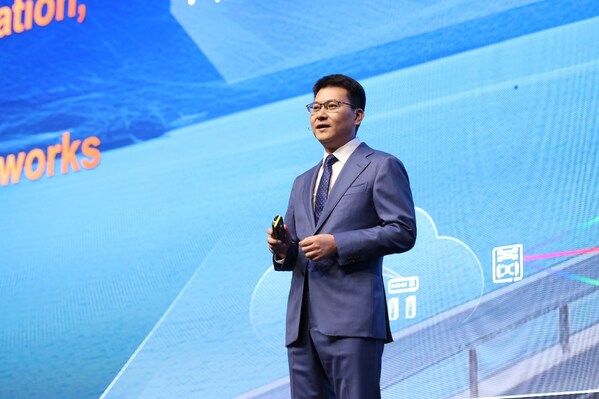ISTANBUL, Turkey, Nov. 3, 2024 /PRNewswire/ -- Today, at the 10th Ultra-Broadband Forum (UBBF 2024), Bob Chen, President of Huawei Optical Business Product Line, delivered a keynote speech titled Build AI-Centric F5.5G All-Optical Network for New Growth.
The AI era is upon us. General foundation models are continuously enhanced, and are quickly applied to various industries. So far, more than 1300 foundation models have been applied. In addition, AI is widely used in mobile phones, PCs, and automobiles. In the future, AI will be an indispensable part of terminals. AI helps us in travel planning, code generation, and quality inspection. In the future, AI will transform every aspect of our life, work, and production.
Bob Chen noted that in the AI era, some carriers will transform to AI all-service providers, and some carriers will cooperate with third parties to provide services such as AI computing and AI applications. For carriers, building robust infrastructure networks and "enhancing computing with networks" will be the key to business success in the AI era. AI device-cloud synergy, and intelligent computing training require high network bandwidth, low latency, and high reliability. Huawei is continuously innovating F5.5G in optical transmission, optical access, and management and control platform, helping carriers build AI-centric all-optical networks.
In the optical transmission field, Huawei's leading optical switching technology is extended to data centers (DCs) and metro edges. First, with optical switching, DCs support the scale and efficiency improvement of AI computing. Huawei's DC optical switching solution supports the expansion of intelligent computing from 1000 cards to millions of cards based on ultra-dense ports and ultra-low power consumption. Compared with traditional solutions, the optical module-free deployment mode reduces the failure rate by about 20%. In addition, with all-optical switching at metro edges, Huawei helps carriers build 1 ms, 5 ms, and 10 ms latency circles through mesh networking, and all-optical one-hop connection for end-to-end all-optical switching from the backbone to the metro, ensuring ultimate AI experiences. Up to now, more than 50 carriers around the world have extended optical switching to metro edges and built 1 ms metro networks.
In the optical access field, Bob Chen noted that fixed broadband must provide premium services. Based on optical fiber connections, fixed broadband provides deterministic and guaranteed service experiences for every user. Globally, there are three monetization modes for fixed broadband: coverage monetization, bandwidth monetization, and experience monetization.
First, coverage monetization. Currently, no fiber connection is available to more than 28% of global users. Therefore, fiber coverage needs to be accelerated to seize the demographic dividend. Huawei solutions including QuickConnect ODN and all-scenario AirPON can help carriers achieve fast and low-cost network construction.
Second, bandwidth monetization. First, some carriers have deployed fiber broadband, but their package rates are only dozens of Mbps. As a result, the value of optical fibers is not unleashed. Therefore, we recommend that packages be gradually upgraded to provide more competitive broadband services. Second, some carriers have offered gigabit packages, but the experience is poor and video freezing often occurs. The root cause is that GPON is used to provide gigabit packages. Therefore, GPON should be upgraded to 10G PON as soon as possible to provide better network experiences.
The last is to monetize experience. Now, the industry has a consensus on the evolution from FTTH using one fiber to FTTR using one network. FTTR networking can ensure optimal experience for everyone anytime and anywhere. So far, the number of global FTTR users has exceeded 30 million. In addition, Huawei is accelerating the innovation and upgrade of FTTR+X to help carriers innovate AI applications, including AI plus storage, home guard, and healthcare. Our ultimate goal is to support one smart home based on one FTTR network.
As for the management and control platform, Huawei uses digital twin and AI foundation models to improve user experience and O&M efficiency in premium broadband and premium transmission solution scenarios. Huawei's Premium Broadband solution uses automatic fault locating to implement minute-level network fault diagnosis and proactive poor-QoE rectification, slashing user complaints by 30%. Its Premium Transmission solution uses automatic online planning to shorten the new service TTM from months to hours.
"The next decade will witness the fast popularization of AI," Bob Chen stated. "Huawei hopes to work with industry partners to build an AI-centric F5.5G all-optical network, extending optical switching to data centers and metro edges, building premium networks for optical access by monetizing coverage, bandwidth, and experience, and fully injecting AI capabilities to the management and control platform. In this way, we can accelerate AI popularization and achieve new business growth together in the intelligent era!"
source: Huawei
【你點睇?】TikTok美國禁令生效前大批「TikTok難民」湧入小紅書,你認為該現象會否對中美文化交流帶來正面影響?特朗普暫緩禁令後小紅書熱潮會否持續?► 立即投票
























